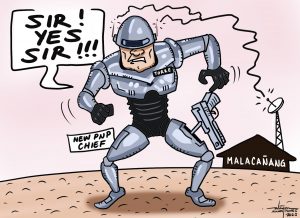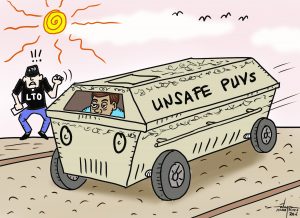Most Filipinos are now talking about who will replace Vice-President Sara Z. Duterte as Secretary of Education.
And some political commentators are calling for another “revolution” similar to the People Power at EDSA that ousted the father of our current Philippine President. What I would like to see instead is a revolution in our education.Because no matter who heads the Department of Education (DepEd) if we continue to teach the same old things the same old way, we will remain stuck in this rut.
I recently read an essay written by British educator and contemporary historian, Sir Anthony
Seldon, entitled “The Fourth Education Revolution,” and apparently we are at the start of it.
Seldon wrote that the first education revolution “happened five million years ago with the
beginning of learning by watching and repeating.” The second education revolution was “the beginning of organized learning in schools, happened some 5,000 years ago.” The third
education revolution began “roughly 500 years ago, made possible by the invention of the
printing press.” He noted that this was also the time of the great global expansion of universities.
“We are living in the twilight years of that revolution,” Seldon said, referring to the third
education revolution. “Our current era makes bountiful use of new technologies, but education
remains fundamentally the same — students sitting in front of teachers and lecturers, preparing for tests and exams focused on a fixed curriculum on which their future progress will very largely depend.”
He noted that schools are still physical places where learning takes place for a few hours each day. Teachers, lecturers and books are still the primary sources of knowledge just like in the 19th century and teacher training remains fundamentally unchanged from 40 years ago.
How then should we educate our children in the 21st century, as the world rapidly transitions
from the Age of Information to the Age of Intelligence?
Seldon believes that education today must not be afraid of, but embrace, Artificial Intelligence
(AI) and that educators, not tech corporations nor even government, must take the lead in this
Fourth Education Revolution.
“Instead of using adult humans to teach young people to be like machines, we need to use AI-
powered machines, guided by adult humans, to teach young people to be more fully human,” he said.
I agree with his view that we are teaching young people to be like machines and, sadly, AI will
always do better in that aspect. Because it can process information faster than any human brain and it does not have the emotional baggage and physical limitations humans have.
AI does not depend on constant programming by humans, it learns and adapts by itself. In a few years, AI will be very good at communicating with humans and we must prepare to take
advantage of that to improve our lives, starting with education.
Seldon shares the following ways AI can help schools: One, with AI’s help, every student can receive high quality, personalized teaching, formative assessment and grading. Each student can move individually at a pace that is right for each person’s circumstance.
Two, AI can help with teacher workload and excessive stress. Preparation of lessons, marking
and assessment can be taken over by AI so teachers can focus on personal interactions and
mentoring their students.
Three, with AI’s virtual and augmented reality tools, there can be endless opportunities for
deeper enjoyment of learning and creative ways to make complex subjects more
understandable to learners.
Four, mental health issues among students can also be addressed with AI by removing the
stressful practice of getting valued and validated by the school system solely based on their
success at passing exams. With AI’s personalized teaching and tutoring, children can feel good about learning and teachers can have more free time caring for their students.
Five, AI can help “develop all types of intelligence, including creativity, interpersonal
relationships, self knowledge, character, and leadership capabilities.” It will develop all talents
that young people have, not just cognitive intelligence, which is the focus of most school
systems.
And, if I may add, AI can also help minimize corruption in our educational system with more
effective ways to promote transparency, accountability, and make human intervention (like the
fixers and the bribers) obsolete in most transactions.
We must abandon the concept of education as a tool for oppression and a factory for capitalism.
In my experience, what I really learned in school was how to conform (appear to be like
everybody else); how to please authorities (teachers, school administrators, government); and
how to game the system (get good grades, pass all tests, do the bare minimum with maximum impact, not get caught violating any rule).
In truth, my love for learning was acquired before I was part of the school system. It started at home with books, creative activities, playing with others, being in nature, engaging the world, being free to be who you want to be, exploring possibilities, creating and innovating. That’s why I think home school is better than “the same old” school.
It was school that made learning boring for me that I wanted to cut classes and do more fun
stuff outside the classroom. Thank goodness for extra-curricular activities and field trips, my basic education experience was not all that traumatizing. Looking back now I realized I wasted so much time in my youth memorizing useless stuff I can just google on my mobile phone now.
I learned more about the world and about life now while exploring the world wide web than all
my years in school. What made a difference then were the few great teachers who saw what
made me special and encouraged me to be who I want to be and believed that I can. If those
teachers had the tools we have now, I am sure their impact would be even greater. So I am
excited how today’s educators will use new technologies to make children be life-long learners and better humans.
We now have awesome tools we never had before that can solve many of our existing problems. Let’s get creative and have a real education revolution now.


